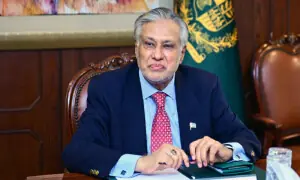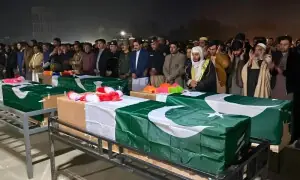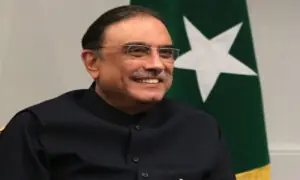Jinnah House attack: SC judge wonders if any army officer tried in military court for security breach
5 min readJustice Hasan Azhar Rizvi, a member of the constitutional bench hearing the case of a military trial of civilians, has wondered whether a military trial for any army officer was conducted for an alleged security breach during an attack on Jinnah House (Lahore Corps Commander).
He was part of the seven-judge bench hearing intra-court appeals against the Supreme Court’s October 2023 order of nullifying the military trial of civilians involved in the May 9 violence
The seven-member constitutional bench, led by Justice Aminuddin Khan, resumed the hearing on Tuesday into the appeals. The bench includes justices Jamal Mandokhail, Muhammad Ali Mazhar, Hassan Azhar Rizvi, Musarrat Hilali, Naeem Akhtar Afghan, and Shahid Bilal Hassan.
In the last hearing on Monday, Justice Hilali wondered whether the Pakistan Army Act (PAA) 1952 outlined any punishment for officers who suspend the Constitution. She also posed questions about Article 6 (High Treason) of the Constitution, which deals with high treason.
Last month, Rana Ihsaan Afzal Khan, the prime minister’s coordinator, said the government would approach the international community to clarify its concerns over the sentencing of civilians by military courts.
“The government will approach them [European Union, United States, and United Kingdom] if there is any misunderstanding,” he said while appearing on the Aaj News programme Spotlight with Munizae Jahangir on December 30, 2024.
Hearing
Defence Minister lawyer Khawaja Haris began his arguments by referencing the Liaquat Hussain case, saying that the case pertained to the trial for civilians for civil crimes in military courts.
Justice Mandokhel remarked on the need to assess under what circumstances certain civilians could be tried.
Haris stated that trials for inciting military personnel to stop performing their duties would fall under the Army Act. He noted that the Supreme Court has previously ruled that “retired personnel are considered civilians.”
The SC judge said that the entire argument relies on the FB Ali case, which involved both retired and active-duty officers. He further questioned whether anyone in the current case was accused of inciting military personnel to cease their duties, stating that under the Army Act, a crime would only be established if a serving officer makes a complaint or is involved in the matter.
The defence ministry lawyer asserted that anyone who disrupts military discipline would face trial in a military court. In response, Justice Mandokhail questioned whether attacking a military convoy would also be considered a breach of discipline.
Justice inquired about situations where military personnel have a dispute with a civilian at a checkpoint, asking if that too would be classified as a breach of discipline.
Justice Mandokhail remarked that the scope of the Army Act defined by the lawyer could encompass any individual.
Justice Hasan Azhar Rizvi advised Haris to consider that the FB Ali case originated during martial law when Zulfikar Ali Bhutto was the chief martial law administrator and the case arose from attempts to remove him. He noted that martial law ended when the Constitution was established.
Haris conceded the point but emphasised that the court’s decision does not mention the imposition of “emergency powers.” He clarified that the individuals involved in the FB Ali case were retired.
Justice Hilali queried about the procedure if a soldier has a dispute with a civilian in a cantonment area, asking where such a case would be directed.
The lawyer responded that a “disagreement is a separate issue.”
Justice Mandokhail remarked that the scope of military trials is “being excessively broadened.”
In response, Haris stated that even in peacetime, civilians who intervene in military matters would face trials in military courts.
Justice Rizvi noted that there must be a mastermind behind any conspiracy, questioning who initiated it.
Haris reiterated that trials for conspirators or masterminds would also occur in military courts, emphasising that the trial of civilians was not a recent development, as the law has been in place since 1967.
Justice Rizvi asked the lawyer has there had been a trial of any military officer involved in the events of May 9. He wondered how people managed to reach the Corps Commander’s House in Lahore without weapons. Their entry into the Corps Commander’s House constitutes a security breach, the judge added.
Haris responded that the protesters were accused of damaging property and told the court that no military officer had been tried in connection with the May 9 incident.
Justice Mandokhail remarked that the allegations in the FB Ali case involved collusion among certain individuals within the institution, highlighting that proof of internal collaboration was “essential.”
He noted that an institution consists of individuals and sought clarification from the lawyer if there was any connection with individuals inside.
Haris replied that if he were to steal a gun from a defence institution, the trial would still take place there.
Also, read this
UK, US join EU in expressing concern over military court sentencing of May 9 suspects
SC’s interim order on military trial for civilians may impact future decisions: PTI’s Zafar
Justice Mandokhail questioned what connection could be established from within in the case of gun theft.
Justice Mazhar then asked where the FIR for the gun theft would be filed. “Many people were simply passing by on May 9 and were unaware of the situation.”
Haris responded that not all of those individuals would be tried in military courts, stating, “I will present the details of the accused. The military cannot fight a war without discipline; any obstruction to military duties is also a violation of discipline.”
Justice Mandokhail pointed out that the key question was how broadly the application of the Army Act could be extended. He noted that the anti-terrorism act was a “stricter law” than the Army Act, with harsher penalties and no leniency.
Later, the court adjourned the hearing on the intra-court appeal against the decision to try civilians in military courts until tomorrow (Wednesday).
For the latest news, follow us on Twitter @Aaj_Urdu. We are also on Facebook, Instagram and YouTube.

























Comments are closed on this story.